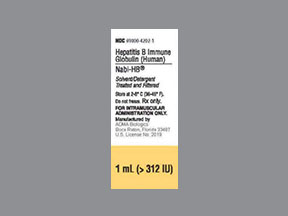
Nabi-hb Coupons & Savings Card – Discount Prices from $145.09
My prescription
Edit
1ML of 312UNIT/ML, Nabi-hb (1 Vial)
Select pharmacy

Walmart
$145.09
COUPON PRICE
Walgreens
$156.08
COUPON PRICE
Albertsons
$165.03
COUPON PRICENabi-hb savings card
Show this card to your pharmacist
Walmart
$145.09
BIN
ID
PCN
GRP
019876
LH31157DDA
CHIPPO
LHX
Powered by
Price history for Nabi-hb
1 Vial, 1ML of 312UNIT/ML
Average retail price for Nabi-hb
Average SaveHealth price for Nabi-hb
Our price history data is based on aggregated prescription data collected from participating pharmacies in America. Our prescription data updates daily to reflect the latest price changes. If you notice a missing data point, it means there wasn't sufficient data available to generate a monetary value for that date.
*Retail prices are based on pharmacy claims data, and may not be accurate when we don't have enough claims.
Nabi-hb dosage forms
Dosage Quantity Price from Per unit 1ML of 312UNIT/ML 1 Vial $145.09 $145.09 1ML of 312UNIT/ML 2 Vials $309.17 $154.59 1ML of 312UNIT/ML 3 Vials $473.25 $157.75
| Dosage | Quantity | Price from | Per unit |
|---|---|---|---|
| 1ML of 312UNIT/ML | 1 Vial | $145.09 | $145.09 |
| 1ML of 312UNIT/ML | 2 Vials | $309.17 | $154.59 |
| 1ML of 312UNIT/ML | 3 Vials | $473.25 | $157.75 |
Is Nabi-HB a vaccine?
Yes, Nabi-HB is a vaccine. It is used to provide passive immunity to individuals exposed to the hepatitis B virus by supplying them with hepatitis B immune globulin.
What is the difference between HepaGam B and Nabi-HB?
HepaGam B and Nabi-HB are both hepatitis B immune globulin products used to provide passive immunity to hepatitis B. The primary difference between the two lies in their manufacturing processes and specific formulations. Both are used to prevent hepatitis B infection in individuals who have been exposed to the virus or in certain high-risk situations, such as after liver transplantation in hepatitis B positive patients. The choice between the two may depend on availability, specific clinical guidelines, or physician preference.
Is hep B immunoglobulin a vaccine?
Hepatitis B immunoglobulin (HBIG) is not a vaccine. It is a preparation of antibodies used to provide immediate, short-term protection against hepatitis B infection, typically administered after potential exposure to the virus. In contrast, the hepatitis B vaccine is used to provide long-term immunity by stimulating the body's immune system to produce its own antibodies.
What is the difference between hepatitis B vaccine and hepatitis B immune globulin?
The hepatitis B vaccine is designed to provide long-term protection by stimulating the body's immune system to produce antibodies against the hepatitis B virus. It is typically administered in a series of shots over a period of time.Hepatitis B immune globulin (HBIG), on the other hand, is a preparation of antibodies that provides immediate, short-term protection against the virus. It is often used in situations where there has been a recent exposure to hepatitis B, such as a needlestick injury or a newborn born to a hepatitis B-infected mother, to provide immediate passive immunity.In summary, the vaccine is for long-term prevention, while HBIG is for immediate, short-term protection following exposure.
What is the cost of Hep B hemoglobin injection?
The cost of a Hepatitis B immunoglobulin injection can vary widely depending on factors such as the location, healthcare provider, and insurance coverage. It is recommended to contact a local pharmacy or healthcare provider for the most accurate and up-to-date pricing information.
